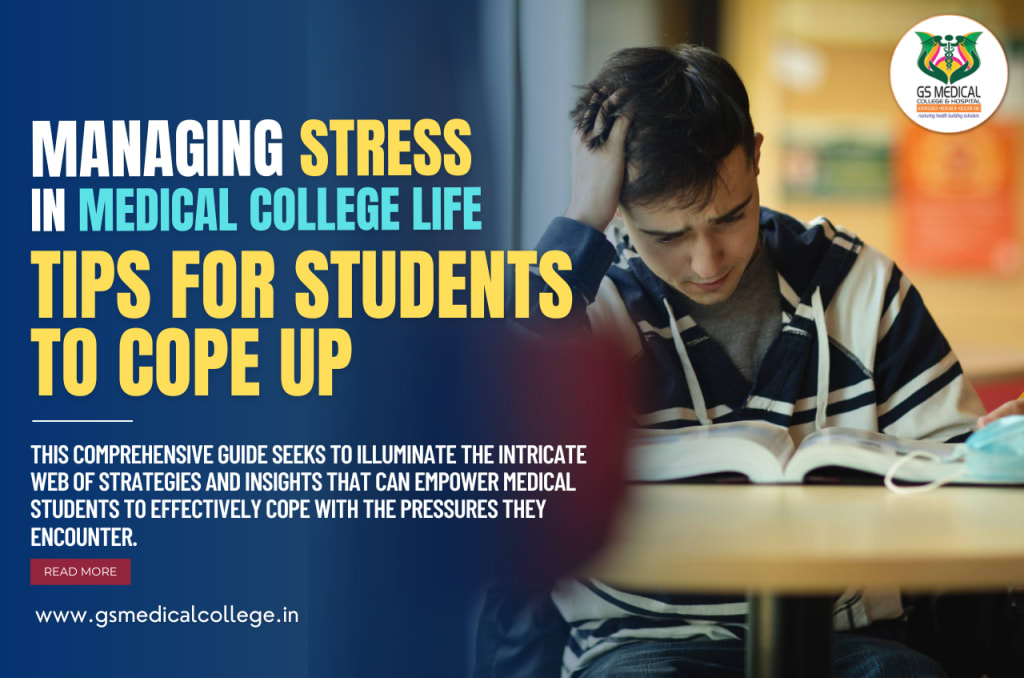Managing Stress in Medical College Life: Tips for Students to Cope Up
Embarking on a transformative journey through medical college is undoubtedly a profoundly enriching experience, but it undeniably comes with its fair share of formidable challenges.

Embarking on a transformative journey through medical college is undoubtedly a profoundly enriching experience, but it undeniably comes with its fair share of formidable challenges. As aspiring physicians navigate the rigorous academic landscape, stress management emerges as a critical cornerstone of their daily lives. This comprehensive guide seeks to illuminate the intricate web of strategies and insights that can empower medical students to effectively cope with the pressures they encounter. Specifically focusing on the vibrant academic hubs of Uttar Pradesh, renowned for hosting some of the best private medical colleges in Delhi NCR, we explore tailored advice to address the unique stressors faced by students in these regions. From time-tested study techniques to fostering a resilient mindset, this guide endeavors to be a beacon for those treading the demanding path of medical education.
What are the factors leading to stress in college students?
Stress is an inherent part of the college experience, with 80% of students facing it daily, as per the Anxiety and Depression Association of America. This stress significantly influences academic performance, affecting one in three students negatively. Various factors contribute to stress among college students, including the transition from home to campus life, financial struggles, academic pressure, conflicts with roommates, relationship issues, and post-graduation uncertainties.
Living away from home is a significant stressor, as students grapple with newfound independence and responsibilities. Financial strain is another prevalent issue, with the high cost of college causing stress for 70% of students. Academic pressure, often tied to scholarship maintenance or personal expectations, poses a common stressor that can lead to mental health issues if not managed.
Conflicts with roommates in shared living spaces can impact grades and increase dropout risks. Relationship issues, whether with family, friends, or partners, can be both a source of support and stress. Additionally, the looming post-graduation phase induces stress and anxiety, as students face the challenge of transitioning into the real world.
To mitigate these stressors, college students are encouraged to develop coping strategies, identify the root causes of stress, and seek support when needed. By addressing these challenges proactively, students can enhance their overall college experience and well-being.
Stress management for college students - Key Tips
Effectively managing stress is crucial for college students, as prolonged stress can negatively impact mental and physical well-being, grades, and relationships. Understanding the sources of stress is the first step in developing coping mechanisms. Consider these twelve strategies when feeling overwhelmed or anxious:
Ensure sufficient rest and sleep: Quality sleep aids in brain recharge, muscle repair, memory consolidation, and immune system boost. Avoiding all-nighters and implementing pre-bedtime practices, like reducing caffeine intake and limiting screen time, can improve sleep quality.
Prioritize health and nutrition: Stress can influence appetite, leading to overeating or undereating. Developing habits such as maintaining a balanced diet, regular exercise, and adequate sleep can manage stress and prevent extreme weight fluctuations.
Stay active: Regular exercise enhances overall health, reduces stress, combats fatigue, and improves cognitive function. Physical activity stimulates the production of endorphins, acting as natural mood lifters.
Cultivate a stress outlet: Having a healthy outlet, such as a hobby, social club, or physical exercise, provides relief during stressful times.
Build connections: Establishing a support system aids in stress relief by counteracting the body's fight-or-flight response. Social interactions reduce the risks of mental and cardiovascular health issues.
Practice self-care: Allocating time for self-care, such as spa days, meditation, or personal outings, reduces tension caused by stress.
Manage time effectively: Ineffective time management contributes significantly to college stress. Developing strategies to prioritize tasks and staying organized can improve academic performance and reduce stress.
Stay organized: Maintaining an organized schedule, using tools like calendars and planners, and keeping living and workspace tidy reduce distractions and anxiety.
Embrace positive thinking: Positive thoughts enhance physical well-being and provide mental clarity. Counteracting negative thoughts with positive encouragement during stressful periods can mitigate chronic stress.
Try mindfulness exercises: Incorporating mindfulness, such as meditation, into daily activities enhances awareness and reduces stress.
Engage in journaling: Writing down thoughts and feelings, or maintaining a stress journal, provides therapeutic benefits and helps identify patterns of stress for effective management.
Seek help when needed: Reach out for assistance before stress becomes overwhelming. Utilize mental health resources offered by the school or consult with professionals to identify triggers and develop coping strategies.
What Constitutes Stress and How Does It Impact College Students?
Stress is a physiological response to emotional triggers, stemming from both positive and negative events, such as the anticipation of a wedding or the loss of a loved one.
When faced with stress-inducing emotions, the adrenal gland releases epinephrine, initiating the fight-or-flight response, followed by the release of cortisol. While crucial in dangerous situations, prolonged elevated cortisol levels can adversely affect metabolic rate, memory formation, and blood sugar regulation.
Stress manifests in three primary forms:
Acute Stress: This is the most common type, arising from day-to-day stressors like tardiness, rushing to class, or receiving a poor grade. Acute stress typically fades quickly with minimal mental or physical impact.
Episodic Acute Stress: Occurring when an individual experiences acute stress recurrently over an extended period, episodic acute stress often manifests in symptoms like migraines and tension headaches.
Chronic Acute Stress: This form arises when someone faces prolonged exposure to a stressful situation they cannot avoid. For instance, students grappling with academic challenges in a demanding course may develop chronic acute stress, leading to issues like weight gain, sleep deprivation, and heightened anxiety.
Seeking Help for Stress Management: Where Students Can Go?
Seeking help for managing stress is crucial, and numerous resources are available to support students facing elevated stress levels jeopardizing their physical, emotional, and mental well-being. Various options include:
On-Campus Mental Health Services:
Many of PG Medical Colleges in Uttar Pradesh provide on-campus mental health services, often accessible virtually. Explore your school's official website for details or contact student services for immediate assistance. These services may encompass mental health clinics, online screenings, and individual or group counselling, contributing to improved mental well-being and overall success in academics and social aspects.
Off-Campus Centers and Hotlines:
If on-campus resources are insufficient, schools guide students to external services like local counselling or therapy centers. Additionally, students can utilize 24/7 hotlines for immediate support. The 988 Suicide & Crisis Lifeline at 988 or 1-800-273-8255 offers a platform to engage with trained professionals, addressing concerns such as suicide ideation, severe stress, depression, and anxiety.
Conclusion:
Navigating stress in a medical college is a collective journey for students, and adopting effective coping strategies is crucial for success. The list of Private medical colleges in UP, such as GS Medical College, prioritize student well-being, offering a comprehensive approach to education. By implementing these tips and leveraging the available support systems, students can not only endure but excel during their PG Medical Colleges in Uttar Pradesh’s journey, ensuring a balanced and successful academic experience.
About the Creator
GS Group
Best/Top Private Medical College in UP, Delhi, Ghaziabad, Hapur, Pilkhuwa, Meerut - GS Medical College is one of the best growing campus in the country providing Medical Education. For more info visit us: https://gsmedicalcollege.in/






Comments
There are no comments for this story
Be the first to respond and start the conversation.